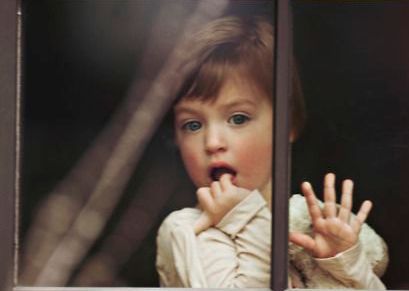Teach with Love, Not Based on Fear and Restriction


Written and verified by psychologist Valeria Sabater
To teach with love is the key to most things in life. Contrary to what many people think, a strict upbringing doesn’t guarantee success in raising children.
Obedience instilled from shouts and rigid rules results in fear and insecurity.
In fact, it’s curious how within our own language we associate “the obedient and docile child” with something that is hoped for and even expected by most families.
But sometimes there is low self-esteem and unhappiness behind that docile child.
This is the child who had so many walls put up around them that they understand life only as a prison.
In addition to that, their minds become unable to take initiative because they expect other people to tell them what they can or cannot do all the time.
The happy child is one who explores, plays laughs, and communicates. This is because fear and strictness clip the wings of growth and self-esteem.
So when you’re selecting what type of parenting you want for your children, you must choose the one that will let them grow with integrity.
The type that will enable them to live with respect in the world, to be able to be happy and to provide happiness.
Below, we offer some simple guidelines for you to consider.
Restrictions in education
Everyone wants to have a child who listens to them, who wants to please them and meet the standards that are set.
While it’s true that this is something to be desired for, don’t forget that such behavior must be in harmony with others.
Obedience of the rules must go hand in hand with understanding them.
- A child must understand what is expected of them at every moment, and why you would enforce rules.
- I do what my mom says because she wants what’s best for me. I put away my toys every night because I need to keep my room tidy. I’m silent when others speak out of respect and to listen.
Children shouldn’t obey rules out of fear or fear of punishment. Behavioral psychology doesn’t always work when it comes to education.
If your child gets used to shouting or another reproach every time they make a mistake or act inappropriately, they’ll develop fear and anger toward you, toward their parents.
Next, we’ll explain this in more detail.
 Education based on fear creates unhappiness
Education based on fear creates unhappiness
Early childhood is the time period between being one month old and seven years of age. Everything that happens in this period is the key to future development.
See also: Caresses nourish the heart
- Every parent wants their child to obey them when they are asked to do something.
- This helps the child become integrated into the dynamics of the family, and it also keeps them safe.
But children always want to go beyond the boundaries to prove themselves, as well as to you.
- If every time they go outside those limits they are met with severe punishment, yelling, or reproach, a child can react in two ways.
- It will feed their anger, so they’ll challenge you even more, or they will become more closed within themselves.
- A child shouldn’t spend their early childhood feeling fear every day.
- Fear erodes their self-esteem and causes undue stress on the young, maturing brain.
- Rearing based on punishment makes a child focus only on outside recognition. You produce an indecisive person who doesn’t have any self-confidence.
Everyone who discovers the world through the lens of fear because their family grows up with unhappiness.
“If the people who love me the most make me afraid, I have to defend myself in this world.”
 Teach with love and respect
Teach with love and respect
- Teaching with respect means telling your child what is expected of them at every moment. At the same time, it means encouraging them to be themselves, free to explore the world safely at your side.
- To teach with love means there’s no need for shouting, and instead arguments are carried out in a relaxed, clear voice.
- If you want to teach your children with love to be obedient, you also need to listen. Pay attention to their thoughts, and based on them you can make suggestions, clarifications, and add guidance.
- Don’t try to have perfect children. Your goal should be to raise happy children who know the rules of your family and of society itself.
- To teach you to need to give your child a voice. If you focus on punishment and reproach and only point out what they’re doing wrong, you will raise someone who is unable to assert themselves.
- Instead of being too severe when they misbehave, explain what they have done wrong and how they can do better.
- Remember that it’s not good to make too many demands. You don’t want to create a child that’s submissive and silent.
Focus on the natural talents your child has so that they can feel confident when it comes time to strive for what makes them happy.

Learn to “connect” with your child, rather than punish them. If you understand their needs, you can better help them grow day by day.
To teach with love will come naturally if you are patient enough to try.
All cited sources were thoroughly reviewed by our team to ensure their quality, reliability, currency, and validity. The bibliography of this article was considered reliable and of academic or scientific accuracy.
- Janzen, H. L., Hildebrand, D. K., Kaufmann, L., & Saklofske, D. H. (2001). Depresión en los niños. National Association of School Psychologist. https://doi.org/10.1007/BF01150711
- Cecilia, G., López, H., Cristina, M., & Vesga, G. (2009). Interacción familiar y desarrollo emocional en niños y niñas *. Revista Latinoamericana de Ciencias Sociales, Niñez y Juventud. https://doi.org/10.1111/ajsp.12099
- Positivo, R., Darle, C., Quitarle, N., & Negativo, E. R. (2012). Refuerzos Y Castigos. Seeducansolos.
-
Pulido, S., Castro-Osorio, J., Peña, M., & Ariza-Ramírez, D. P. (2013). Pautas, creencias y prácticas de crianza relacionadas con el castigo y su transmisión generacional. Revista Latinoamericana de Ciencias Sociales, Niñez y Juventud, 11(1), 245-259.
-
Palacios, J., & Castañeda, E. (2009). La primera infancia (0-6 años) y su futuro. Organização dos Estados Ibero-americanos para a Educação, a Ciência ea Cultura= Organización de Estados Iberoamericanos para la Educación, la Ciencia y la Cultura.
This text is provided for informational purposes only and does not replace consultation with a professional. If in doubt, consult your specialist.








